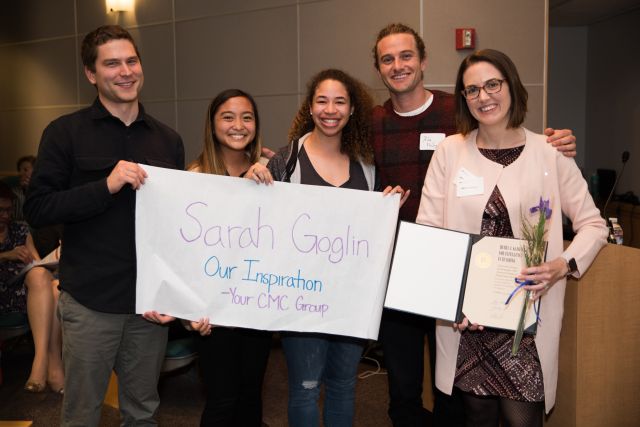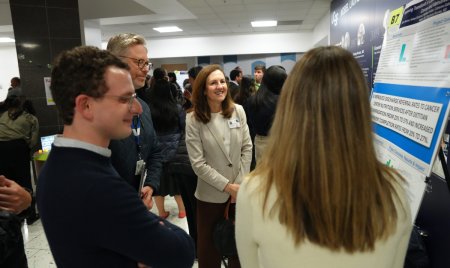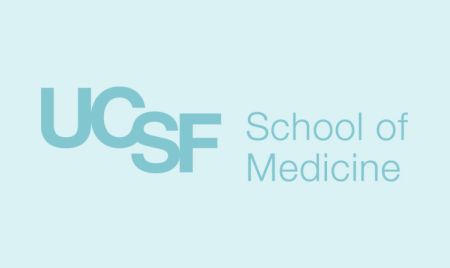Teaching Awards Ceremony highlights faculty excellence and commitment to diversity, equity, and inclusion

Sarah Goglin, MD, was presented with an award for Outstanding Coach
“UCSF and its School of Medicine are committed to fostering a culture of mutual respect among students, faculty, and staff. We believe that all learners and members of our educational community have the right to function in a respectful educational environment conducive to learning. As a community, we are committed to achieving a culture of equity and inclusion for all who learn, work, care, and discover here.” Catherine Lucey, MD, Executive Vice Dean, Vice Dean for Education.
UCSF teaching faculty who exemplify these values in teaching and patient care were honored at the School of Medicine’s Teaching Awards Ceremony October 30. Over 100 medical students, faculty, residents and graduates gathered at the Parnassus Campus to recognize the visionary work and leadership of talented faculty educators.
This year, the annual ceremony especially recognized faculty and learners dedicated to advancing the School’s mission of diversity, equity, and inclusion. The Bridges Curriculum Foundations 1 and 2 Teaching Awards, for example, highlighted the impact of faculty and learners in delivering excellence in settings such as small-group instruction, coaching interactions, and lectures (see sidebar for a full list of recipients). These awards are based on nominations from first- and second-year medical students recognizing outstanding instructors who have demonstrated excellence in teaching during the F1 and F2 phases of the Bridges Curriculum.
Collectively, the Teaching Awards celebrate these talented medical educators at UCSF who are transforming medical education to reflect real-world patient needs, and advancing science to support improved patient care.
“Our internationally renowned faculty shape and teach the next generation of compassionate physicals at UCSF, enabling them to make immediate and impactful contributions as members of interprofessional care teams,” said Dr. Lucey.
For the second time, the awards ceremony also included presentation of the Maxine Papadakis Awards for Faculty Professionalism and Respect—an award that advances UCSF values of professionalism in medical education. The awards highlight faculty who are exemplars in treating students and all others in the clinical environment with professionalism, courtesy, and respect. This year, the award was presented to Nicolaus Glomb, MD, MPH, Assistant Clinical Professor of Emergency Medicine, and Andrew Leavitt, MD, a Professor in the Departments of Laboratory Medicine and Medicine.
“These awards recognize outstanding behavior in shaping excellent cultures of learning and patient care,” said Catherine Lucey, MD, UCSF’s Executive Vice Dean and Vice Dean for Medical Education. “By celebrating the faculty teachers in the core clinical rotations, we have the opportunity to significantly enhance the clinical learning ecosystem for our students such that they can learn, grow and thrive.”
The Maxine Papadakis Awards were presented to faculty in departments that participate in a core third-year or major fourth-year clerkship. The selection committee comprises faculty, residents, and medical students.
Other faculty were honored at the Teaching Awards Ceremony for excellence in teaching, and received Henry J. Kaiser Awards in recognition for outstanding work teaching in classrooms, inpatient care settings, and ambulatory care clinics; Special Recognition Teaching Awards (presented this year to Steven Holtz, MD, FANN, Amanda Schoenberg, MD, and Lisa Sherman, MD) and the Charlotte Baer Memorial Award (presented this year to Ingrid T. Lim, MD) which recognize members of the Volunteer Clinical Faculty who have made contributions through excellence in teaching and who enrich the ability of our students to learn. Finally, the evening included acknowledgements for the Pathways Mentor of the Year and the Teach for UCSF Certificate Program.
Students reflect on faculty they nominated for the Bridges Curriculum Teaching Awards:
“Dr. Sarah Goglin has been instrumental to the success of my CMC group's quality improvement project, and is always willing to help us brainstorm ideas and overcome challenges. I am always impressed by the extent of her knowledge on the subject of quality improvement. Sarah has demonstrated commitment towards my personal and professional development.” Adam Zakaria
“It has been a great joy and privilege to learn from Dr. Katherine Hyland. She is an exceptional teacher, mentor, and role model. Dr. Hyland is not only a brilliant scholar and researcher, but emanates warmth, kindness, generosity, and inclusivity. She creates a safe learning space in which all her students are able to flourish.” Marissa Silverman
“Discussing race in medicine for one hour is no easy feat. But Dr. Andrea Jackson managed to engage with everyone no matter where they fell on that spectrum. She connected what can feel like amorphous ideas of race back to a very concrete clinical context that we all appreciated. She described race as an imperfect proxy for ancestry and highlighted the problems with doing so. The language and examples she used were so accessible, and I feel like a lot of people left her lecture feeling more confident in their understanding of race in medicine.” Juhi Varshney
“The lecture that Dr. Kelly Knight and Joshua Neff (MS4) taught together entitled ‘Cultural and Structural Competency: Language, Literacy, Immigration’ was the most important lecture I attended all year—my entire outlook on healthcare changed. This lecture inspired me to seek out the longer version of their Structural Competency training in Oakland, which I attended on a weekend months later. This was a critical lecture for me in my healthcare career.” Amy Ransohoff
“Dr. Binh An Phan lives a career dedicated to teaching. This is demonstrated not only by the inexhaustible time he commits to facilitating small groups, giving lectures, or instructing on the wards, but also through the relationships he develops with students. His personal and genuine investment into students provides support and encouragement to excel and make it through the challenges of medical education. What is remarkable about Dr. Phan, is the generosity with which he invests his time into bettering others. It is the good fortune of medical students and residents to have him as their teacher.” Aaron Gallagher
Faculty and students’ perspectives on receiving Teaching Awards:
“I am completely humbled to receive this award from UCSF medical students. Especially since it is directly due to their activism, starting with the formation of White Coats for Black Lives, that even allowed me the opportunity to give a lecture that directly addresses the historical roots of racism in the United States. I hope that my lecture, and others like it that are now a part of the core Bridges Curriculum, aid all UCSF medical students in their quest to providing the most equitable, compassionate care to their patients and that they continue to lead the way in their future institutions in field of diversity, equity and inclusion.” Andrea Jackson, MD, MAS, Assistant Professor, Department of Obstetrics, Gynecology & Reproductive Sciences; Director of Complex Contraception
“It is an incredible honor to receive this award and I am completely humbled. I love the opportunity to help learners find their passion and to contribute to their development in becoming compassionate and empathetic physicians. I strive to create an environment of mutual respect and to remain open to the needs of learners while continuing to provide the highest care possible for our patients.” Nicolaus Glomb, MD, MPH, Assistant Professor, Pediatric Emergency Medicine
“I am extremely honored to receive a teaching award. Working with Bridges students has truly been a joy and I feel lucky to have the opportunity to help them in some small way along their training to become physicians.” Justin Bullock, MS4
“Structural competency is a framework that helps physicians recognize and respond to the upstream social and health policies and systems that produce health inequities. The students selection of our lecture helps underscore the importance of this type of pedagogy to the UCSF community, and I am grateful and honored to be part of this work. UCSF medical students see the devastation of health and healthcare inequities every day. I am honored that structural competency has been recognized as a critical educational tool that teaches physicians how to play a role in combating these inequities by addressing upstream policies and systems.” Kelly Knight, MD, Associate Professor, Center for Vulnerable Populations
“I was very honored when I learned about this award. The students' selecting Kelly and me for our lecture helps motivate me to continue working on structural competency curriculum projects moving forward.” Joshua Neff, MS4
“I am very honored to receive this award. Despite remarkable daily scientific advances that deepen our understanding of disease and provide new treatment options, the practice of medicine remains the fine art of making critical decisions with inadequate data, and the relationship between doctor and patient remains an essential keystone for success. Professionalism is at the core of that relationship, and it includes realizing that every patient has a story, so you must listen; that you are responsible for bringing calm and not feeding chaos; and that precision medicine is less about molecular advances and more about precisely tailoring the application of knowledge to the unique manifestation of disease in each patient.” Andrew Leavitt, MD, Professor, Departments of Laboratory Medicine and Medicine (Div. of Hematology/Oncology)
“I am honored to receive a teaching award for my work with students in small groups. Small groups offer an opportunity for deep and meaningful conversations about important aspects of patient care and a life of service as a physician, healer, teacher, colleague, researcher, and advocate. It is my privilege—and my great joy—to participate in these conversations with our students and future colleagues.” Lynn Stasior, MD









